Eye allergies, medically known as allergic conjunctivitis, affect millions of people worldwide. These allergies can cause discomfort, ranging from mild irritation to severe redness and swelling. Fortunately, several natural allergy remedies can alleviate symptoms without the need for eye drops or medications.
These allergens, such as pollen, dust, pet dander, or smoke, cause inflammation of the conjunctiva (the thin, clear tissue covering the white part of the eye). This reaction leads to several irritating symptoms.
Recommended Reading: Best Medicine For Runny Nose And Sneezing (Causes And Treatment)
Natural Allergy Remedies For Eyes (Without Eye Drops)

Table Of Contents
Recommended Reading: Allergy Medicine For Kids: Types, Uses, And Side Effects
What is Eye Allergy?
Eye allergies, also known as allergic conjunctivitis, happen when your eyes react to allergens. These allergens include things like pollen, dust, pet hair, or smoke. When exposed to these, your immune system overreacts, causing the thin layer covering your eye (conjunctiva) to get inflamed.
Remedies For Eyes Allergy | Allergy Remedies For Itchy Eye
Natural Allergy Remedies Eyes
Natural allergy remedies for eye allergies include using a cold compress, applying chilled cucumber slices, and rinsing with saline solution to soothe irritation and reduce symptoms naturally. Natural allergy remedies help relieve itching, rednes
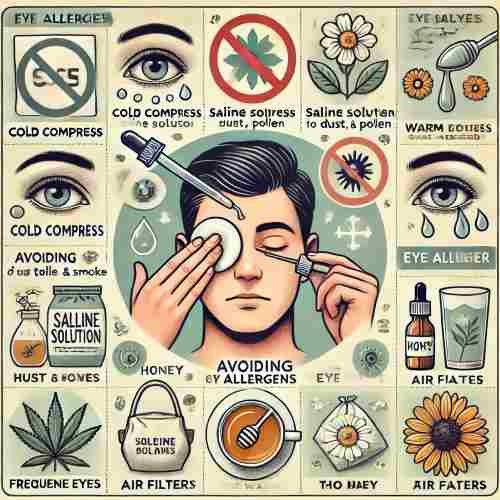
Recommended Reading: Allergy Medicine Dogs: Best Allergy Medicine For Dogs Licking Paws
Natural Remedies For Eyes Allergy
| Allergy Remedies | How to Use |
|---|---|
| Cold Compress | Apply a cold, damp cloth or gel eye mask to closed eyes for 15-20 minutes, repeating every hour. Can also wrap ice cubes in a soft cloth before placing them on the eyelids. |
| Saline Solution | Rinse eyes gently with saline solution to flush out allergens and soothe irritation. Artificial tears can also help lubricate and clean the eyes. |
| Avoid Allergens | Wash face and hands after allergen exposure, clean clothes and bedding regularly, avoid contact lenses during flare-ups, and stay away from smoke or other irritants. |
| Honey | Consuming local honey may help desensitize the body to allergens. Applying a small amount around the eyes (not inside) can soothe irritation. |
| Warm Compress | Soak a clean cloth in warm water, wring it out, and place it on closed eyes for a few minutes to relieve dryness and irritation. |
| Aloe Vera | Apply pure aloe vera gel around the eyes (not directly in the eyes) to reduce swelling and soothe itching due to its anti-inflammatory properties. |
| Tea Bags | Place cold, damp green, or black tea bags on closed eyes for a few minutes to reduce puffiness and irritation. |
| Air Filters | Use air purifiers with HEPA filters to reduce indoor allergens like dust and pet dander. |
| Chamomile | Chamomile tea bags (cooled) can be used as compresses or rinsed on the eyes to ease inflammation. |
| Frequent Eye Washes | Rinse eyes regularly with clean water or saline solution to remove allergens from the eye’s surface. |
| Rosewater | Dab rosewater on cotton pads and place them over the eyes to reduce redness and irritation. |
| Using a Humidifier | A humidifier helps keep the air moist, preventing eye dryness and discomfort. |
Recommended Reading: Best Allergy Medicine For Cats: Types, Uses, & Side Effects
Home Remedies for Eye Allergies
Home Remedies for Eye Allergies
Home allergy remedies for eye allergies include using cold compresses, rinsing with saline solution, and applying chilled cucumber slices to reduce itching and irritation naturally.
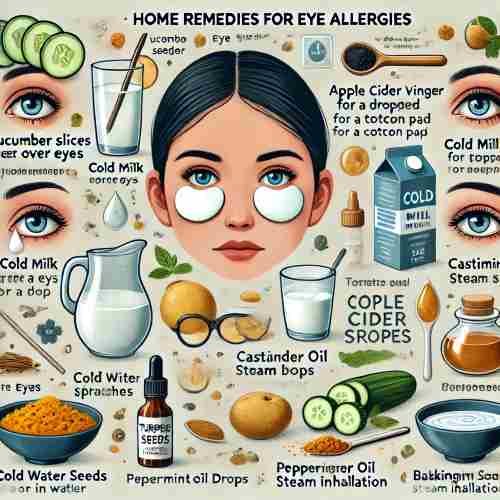
| Home Remedy | How to Use |
|---|---|
| Cucumber Slices | Slice a cucumber and refrigerate it for 30 minutes. Place the chilled slices over your closed eyes for 10-15 minutes. |
| Cold Milk | Dip a cotton ball in cold milk and gently place it over your closed eyes for a few minutes. Repeat as needed for relief. |
| Potato Slices | Cut a raw potato into thin slices and chill them in the refrigerator. Apply the slices to your closed eyelids for about 10 minutes. |
| Turmeric Paste | Mix a small amount of turmeric with water to form a paste. Apply it around your eyes (not inside) and let it sit for a few minutes before washing it off. |
| Apple Cider Vinegar | Mix one teaspoon of apple cider vinegar with a cup of water. Use a cotton pad to apply it around your eyes, avoiding direct contact with the eyes. |
| Castor Oil Drops | Put one drop of cold-pressed castor oil in each eye before bed to moisturize and reduce inflammation. |
| Fenugreek Seeds | Soak fenugreek seeds in water overnight. Grind them into a paste and apply it around your eyes. Rinse with cool water after 10-15 minutes. |
| Coriander Seeds | Boil coriander seeds in water, strain the liquid, and let it cool. Use the liquid to wash your eyes for quick relief. |
| Cold Water Splashes | Wash your eyes with cold water several times throughout the day to flush out allergens and soothe irritation. |
| Peppermint Oil (Steam Inhalation) | Add a few drops of peppermint oil to hot water and inhale the steam by covering your head with a towel. Avoid direct contact with the eyes. |
| Baking Soda Solution | Mix 1/4 teaspoon of baking soda with a cup of water. Use a cotton pad to apply the solution around the eyes, avoiding direct contact with the eyes. |
Recommended Reading: Anti Allergy Medicine For Skin Itching (Uses & Side Effects)
Symptoms of Eye Allergies
Symptoms of Eye Allergies
Allergy remedies for eye allergies help relieve common symptoms, such as itching, redness, swelling, and watery eyes, which are often triggered by allergens such as pollen or dust.
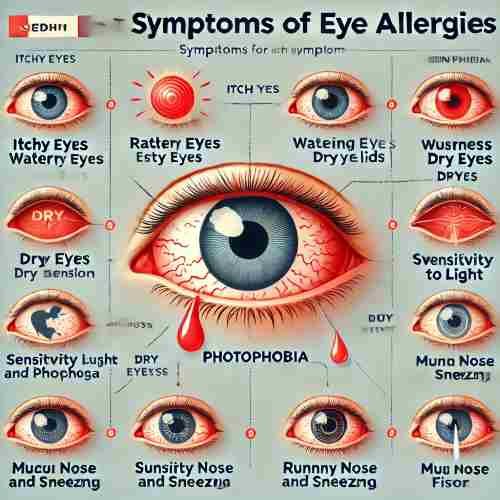
- Itchy Eyes: A persistent urge to rub your eyes is a common symptom of eye allergies.
- Redness: Inflammation caused by allergens makes the eyes appear red or bloodshot.
- Watery Eyes: Excessive tearing occurs as the body tries to flush out allergens from the eyes.
- Burning Sensation: Some people experience a stinging or burning feeling in the eyes.
- Swollen Eyelids: Allergic reactions can cause puffiness or swelling around the eyes.
- Dry Eyes: Despite the watery reaction, many people experience dryness or grittiness.
- Sensitivity to Light (Photophobia): Bright lights may become uncomfortable or painful for those with eye allergies.
- Blurred Vision: Temporary vision blurring can happen due to irritation and swelling.
- Mucus Discharge: Stringy, white mucus may form around the eyes during allergic reactions.
- Runny Nose and Sneezing: Eye allergies often come with nasal symptoms like a runny nose and sneezing.
- Eye Fatigue: Eyes may feel tired or strained, especially after prolonged exposure to allergens.
Causes of Eye Allergies
Causes of Eye Allergies (Allergy Remedies)
Allergy remedies target the causes of eye allergies, which include exposure to allergens like pollen, dust, pet dander, or mold. These allergens trigger itching, redness, and irritation in the eyes.
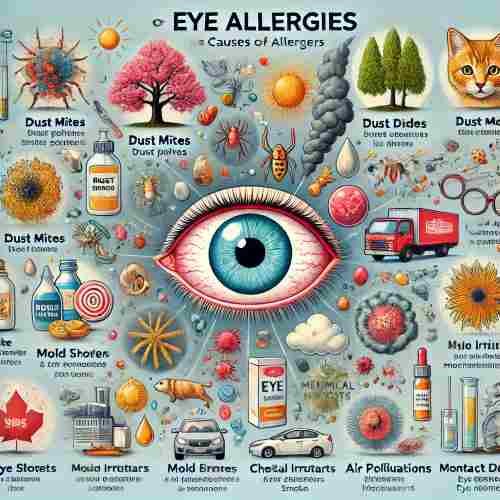
- Pollen: Pollen from trees, grass, and weeds is a major cause of seasonal eye allergies, especially during spring and summer.
- Dust Mites: Tiny creatures that live in dust can trigger allergic reactions, often worsening indoor allergies.
- Pet Dander: Skin flakes, saliva, and fur from pets like cats and dogs can cause allergic reactions in sensitive individuals.
- Mold Spores: Mold grows in damp areas and releases spores into the air, which can lead to eye irritation.
- Smoke: Smoke from cigarettes, fireplaces, or pollution can irritate the eyes and trigger allergy symptoms.
- Perfumes and Fragrances: Strong scents from perfumes, cleaning products, or air fresheners can cause allergic reactions in some people.
- Chemical Irritants: Household cleaning products, chlorine in pools, or industrial chemicals can cause eye irritation.
- Contact Lenses: Allergies can develop due to extended use of contact lenses or the buildup of proteins and debris on the lenses.
- Air Pollution: Polluted air with high levels of smoke, exhaust fumes, or chemicals can worsen eye allergies.
- Medications: Some medications, especially eye drops with preservatives, can trigger allergic reactions in the eyes.
- Animal Hair or Feathers: Hair or feathers from animals can cause allergic symptoms, especially in people with heightened sensitivities.
Preventing Eye Allergies
Preventing Eye Allergies
Allergy remedies for preventing eye allergies include avoiding exposure to allergens like pollen, dust, and pet dander. Regularly cleaning your living space and using air purifiers can also help.
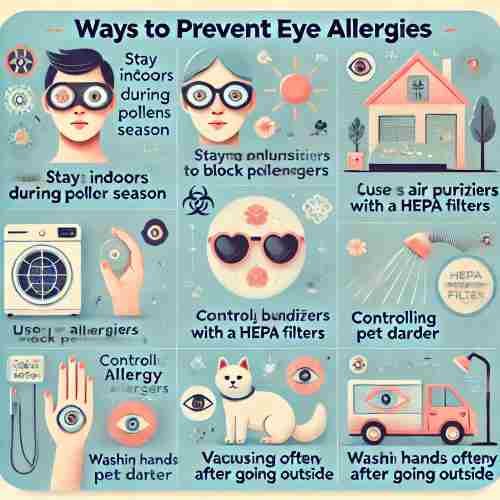
You can manage eye allergies by making simple lifestyle changes to avoid allergens. Here’s how:
Limit Exposure to Allergens
- Stay Indoors: Keep windows shut and use air conditioning, especially during pollen season.
- Wear Sunglasses: Sunglasses help block pollen and dust, along with protecting your eyes from UV rays.
- Use Air Purifiers: Air purifiers with HEPA filters help remove dust, pet dander, and pollen from the air in your home.
- Control Pet Dander: Keep pets out of your bedroom and clean their bedding often if their dander triggers allergies.
Keep Your Environment Clean
- Wash Bedding Regularly: Wash sheets and pillowcases in hot water to get rid of allergens like dust mites and pollen.
- Vacuum Often: Use a HEPA filter vacuum to clean carpets and floors, especially if you have pets.
- Use Allergy-Proof Covers: Cover your bedding with mite-proof covers to protect against dust mites.
Adopt Healthy Habits
- Wash Hands and Face: Clean your face and hands after being outside to remove allergens like pollen.
- Shower Before Bed: This helps remove allergens from your hair and skin, keeping them from irritating your eyes at night.
Recommended Reading: Best Allergy Medicine For Kids
Managing Severe Eye Allergy Symptoms
If your eye allergies become more severe, natural allergy remedies may not be enough. In such cases, it’s important to seek medical help for stronger treatments. Here are some options:
Allergen Immunotherapy
- Allergy Shots: This treatment helps reduce your sensitivity to specific allergens over time by gradually building your immune system’s tolerance.
Prescription Medications
- Antihistamines: In more serious cases, your doctor might prescribe stronger antihistamines to control the allergic reactions.
- Anti-Inflammatory Medications: If the inflammation becomes intense, prescription anti-inflammatory eye drops or pills might be needed to reduce swelling and discomfort.
Common Side Effects of Eye Allergies
Common Side Effects of Eye Allergies
Allergy remedies can help ease the common side effects of eye allergies, such as itching, redness, swelling, and watery eyes due to reactions to allergens like pollen or dust.
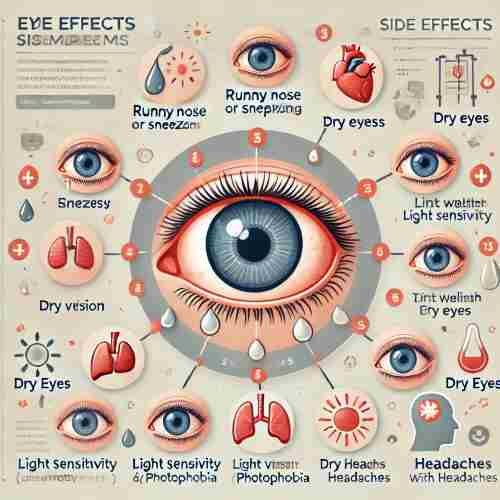
Eye allergies can cause a variety of uncomfortable side effects beyond the common itchy, watery eyes.
- Runny Nose or Sneezing: Eye allergies are often linked with nasal allergies, causing sneezing, runny nose, and sinus discomfort.
- Blurred Vision: Temporary blurred vision can happen due to inflammation or irritation in the eyes.
- Light Sensitivity (Photophobia): Sensitivity to bright lights, making it uncomfortable to be in well-lit environments.
- Redness: The whites of the eyes may become red and bloodshot due to inflammation.
- Swollen Eyelids: Eyelids can swell as a result of an allergic reaction, making them puffy and tender.
- Dry Eyes: Allergies can reduce tear production, causing the eyes to feel dry or gritty.
- Eye Pain or Discomfort: Mild to moderate pain or a sensation of pressure can develop around the eyes.
- Tearing (Watery Eyes): Excessive tearing can occur as the body’s response to flush out allergens.
- Itchy Throat or Ears: Allergies affecting the eyes often extend to itching in the throat or ears.
- Fatigue or Tired Eyes: Allergies can cause eyes to feel tired or heavy due to continuous irritation.
- Headaches: Sinus congestion and eye strain from allergies can sometimes lead to headaches.
Recommended Reading: Best Allergy Medicine For Dogs Licking Paws
FAQs
What causes itchy eyes?
You can try home remedies like using a cold compress, applying chilled cucumber slices, or rinsing your eyes with saline solution to flush out irritants. Avoid rubbing your eyes, as it can make the itching worse.
When should I see a doctor for itchy eyes?
If your itchy eyes are persistent, accompanied by pain, swelling, vision changes, or discharge. These could be signs of a more serious.
Can allergies cause itchy eyes?
Yes, allergies are one of the most common reasons for itchy eyes. When your body reacts to allergens like pollen, dust, or pet hair, it releases histamines, which cause itching, redness, and irritation in the eyes.
Can I use eye drops for itchy eyes?
Yes, over-the-counter eye drops, especially those formulated for allergies, can help relieve itchy eyes.
Is it safe to use makeup when I have itchy eyes?
If your eyes are itchy, it’s best to avoid using makeup around them, as it could worsen the irritation or cause an allergic reaction. Also, make sure your makeup is not expired or contaminated, as this could be a source of irritation.
Can dry eyes cause itchiness?
Yes, dry eyes can lead to itchiness, discomfort, and a burning sensation. Using artificial tears or staying hydrated can help relieve symptoms.
Can screen time make my eyes itchy?
Yes, staring at screens for long periods without breaks can cause eye strain and dryness, leading to itchiness. To avoid this, follow the 20-20-20 rule: every 20 minutes, look at something 20 feet away for 20 seconds.
What are some natural allergy remedies for itchy eyes?
Natural allergy remedies for itchy eyes include using a cold compress, applying chilled cucumber slices, or using saline solution to rinse the eyes. These natural allergy remedies can help relieve discomfort caused by allergens.
Can home allergy remedies help with these symptoms?
Yes, several home allergy remedies can ease symptoms. For example, neti pots can flush out nasal passages, while steam inhalation and honey may help reduce allergy symptoms by soothing irritated airways.
Are there any effective herbal allergy remedies?
Yes, some herbal allergy remedies like butterbur and stinging nettle have been found to help reduce allergy symptoms such as sneezing, itchy eyes, and a runny nose. However, consult a doctor before using herbal allergy remedies.
What allergy remedies work best for seasonal allergies?
For seasonal allergies, common allergy remedies include antihistamines, nasal sprays, and home allergy remedies like air purifiers to reduce allergens indoors.
Recommended Reading: Best Allergy Medicine For Cats Uses, & Side Effects
Conclusion
Managing eye allergies without relying on eye drops is possible with simple, natural remedies and prevention. Reducing exposure to allergens, using cold compresses, and applying natural solutions like cucumber slices or chamomile can help relieve mild symptoms.
These steps can be very effective for everyday comfort. However, if symptoms are severe or ongoing, it’s essential to seek medical advice for other treatment options.
Disclaimer
Commissions we earn from partner links on this page do not influence our content. Our editorial content is based on thorough research and insights from qualified medical professionals to ensure the highest standards of accuracy and reliability.
Information provided on Doseway is for educational purposes only. Your health and wellness are unique to you, and the products and services we review may not be suitable for your individual circumstances. We do not offer personal medical advice, diagnosis, or treatment plans. For specific advice, please consult with a healthcare professional. Doseway adheres to strict editorial integrity standards. To the best of our knowledge, all content is accurate as of the date posted, though offers and information may change. The opinions expressed are the author’s own and have not been influenced, approved, or endorsed by our partners.

 Cart is empty
Cart is empty
Add a Comment